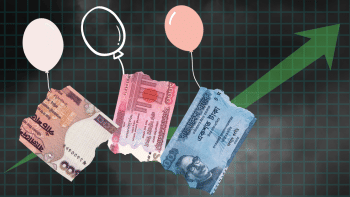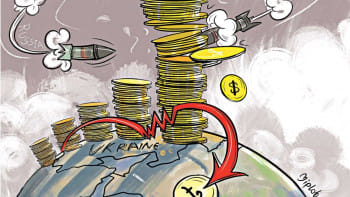Inflation Bangladesh
Could we (please) do better in controlling food prices?
There have been reports of increase in food prices in domestic markets during the post-election weeks
Can the EU visit tip the scales for workers' dignity?
The timing of the visit, amidst labour unrest and pre-election volatility, is particularly significant.
While some buy citizenship, others can’t even afford eggs
Why have the price hikes not pushed regular citizens into action, fuelled by anger?
Govt aims to keep average inflation within 6%
In his budget speech for FY2023-24 at the national parliament today, Kamal said inflation would be largely controlled from here on.
Raging Inflation: Not much help on the way for the poor
Even though poor people are struggling to make ends meet amid runaway inflation, the government allocation for social safety net programmes may not increase much in the next fiscal year.
Inflation falls but still at an elevated level
Inflation in Bangladesh fell slightly to 9.24 per cent in April, driven by a decline in food prices, although it still remains at an elevated level compared to historic trends, official figures showed yesterday.
Our reality versus government's narrative
Why is there so much difference between the reality of common people and that which the government wants to see or project?
How the poor dodge the pangs of hunger
The landless casual workers in rural areas and the urban poor face a bleak prospect.
Poor policy and market management have caused price hikes
Why is the government failing to manage the market as they should?
Oil, sugar price hike yet another shock to the economy
The government must implement economic policies that deal with the ongoing crisis
Denial syndrome is hampering our economic policies
Interventions must involve fiscal policy to address our fundamental economic issues
Denial syndrome is hampering our economic policies
Interventions must involve fiscal policy to address our fundamental economic issues
Current account balance: Sinks further in red
Bangladesh’s current account balance sank further in the red in September, heaving the pressure on the exchange rate that is trading at record lows against the US dollar.
The diary of an inflation-hit newlywed in Dhaka
Acquiring the basic necessities was definitely easier in the past.
The art of tolerance in Dhaka
Some say that living in Dhaka is not easy and for those who have lived here for years, nothing is easy. In fact, living in this city makes it easier to tolerate any other inconvenience with a hair-flip. Someone spat inches away from your feet? Tolerate. It landed on you? Wipe and move on. The world might have a fancy word like noise pollution for needlessly honking cars but we know it for what it really is — soothing white noise that one could even fall asleep to. Which happens often, during the long respites the city graciously bestows on us to and from work every day without fail. We lovingly call them traffic jams.
Inflation rings alarm bells
People in rural areas were hit harder by food and non-food inflation than those in urban areas over the last two months, with the overall inflation surging to a 10-year high of 9.52 percent in August.
Two major economic woes Bangladesh needs to address right now
High inflation and low export and remittance earnings are a major cause for concern at the moment.
Energy prices should be consciously regulated by the government
When global prices dropped, we did not see the energy prices go down in Bangladesh. Why is that?
Inflation in August highest in 12 years
Bangladesh witnessed a record 9.5 percent inflation in August, the highest in 12 years, due to the adverse effects of fuel price hike, said Bangladesh Bureau of Statistics (BBS).











